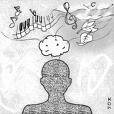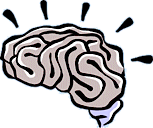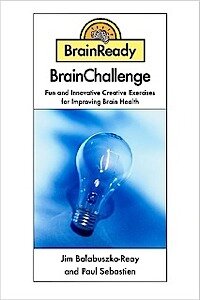
One of the most frequent questions that people have been emailing us about here at BrainReady recently is, "What about music as brain health booster?".
With all of the focus on foods, drinks, dietary changes and exercise that we've (rightly) covered here given the significant impact that these things can have on one's brain health and brainpower, it's easy to overlook the larger topic of music (or the meta-topic of sound in general) as applied to cognitive enhancement.
Most of us have already heard the loose rumor that "classical music is good for your brain", whether as brain-booster while working or as something that mothers should be doing for their developing children or even "sound as audio therapy" unto itself. For many, it may feel intuitive that listening to complex classical music pieces must somehow be better for one's brain than listening to, say, a simplistic three-chord rock anthem or a Rap track featuring a single looping drum beat with repetitive vocal (or many other genres of current pop/rock/rap music).
Or does that truly depend on the song in question, or one's world view, or one's attention to complex subtle nuances that may lie just below the surface of a seemingly trite piece of Pop?
The truth is that the potential for brain-boosting benefits from listening to music (or sound content of any type, for that matter) is a largely unstudied area, ripe for much deeper research spanning far more genres of "organized sound" (music) than certainly exist to date. The trouble is that this kind of research, like most other brain-related research, is extremely difficult to derive clear indications from... clear results and empirical data, given the massive number of variables that enter into the mix when trying to test how music truly impacts real-world human subjects.
The good news is that there already is some good research that suggests impressive, exciting news as to how music can enhance brain function, and if one takes a step back to extrapolate these research results and make an intuitive personal judgment regarding how music may help, it's a no-brainer (sic) to consider giving it a try. And why not: no side effects or contraindications with music listening, unlike supplements and medications and some foods!
The research: music with exercise? In one research study, clinical psychologist Charles Emery of Ohio State University studied the effect of music on people who listened (or did not listen) during regular physical exercise. Emery says, "I've always thought that music had many benefits for people, and increasingly people use music when they exercise, so it seemed like a logical next step in terms of a research project". So along with Evana Hsiao and Scott Hill of Ohio State, and David Frid of Pfizer, Inc., Emery put his theory to the test, with the help of 33 men and women in the final weeks of a cardiac rehabilitation program. Each of the participants were tested for mental performance after exercising without music, and exercising with music.

The results were astonishing: on average, the participants performed more than twice as well on a verbal fluency test after listening to music while exercising than they did after exercising without the music. Wow!
The music selected? Vivaldi's "The Four Seasons".
"When there was no music, there was no change," Emery says.
Emery chose Vivaldi's "The Four Seasons" for the project because prior research by other scientists with that particular piece indicated that it helped patients with lung disease perform better mentally. Emery suspects, however, that similar benefits could be gained by listening to ALL kinds of music, not just classical. It is theorized that the passionate, upbeat rhythms of "The Four Seasons" may stimulate mental performance because it is complex, thus forcing the brain to organize neural transmissions.
But other selections might work better for some people. "I don't think there is anything specific to Vivaldi or even classical music that would necessarily trigger enhanced brain function," Emery says.
But he is confident that music makes a difference, whether it is jazz, hip hop, or classical. And while his research was centered on cardiac patients, because they often suffer mental decline as a result of their illness, Emery thinks it works for everybody, not just those who are sick.
Several other research studies have illustrated how listening to music is a more complex endeavor than it seems on the surface: the human brain has to sort out tones, timing, and sequencing of various sounds, in order to comprehend music. It is believed that the frontal lobe of the brain is stimulated and activated by listening to music, as it is the part of the brain that is associated with higher mental functions such as thinking abstract thoughts, or planning for the future.
Vivaldi or Mozart, but not Glass? Psychologist Frances Rauscher, now at the University of Wisconsin at Oshkosh, and her colleagues made waves with the discovery that listening to Mozart improve d people's mathematical and spatial reasoning. Even rats ran mazes faster and more accurately after hearing Mozart than after white noise or music by the minimalist composer Philip Glass. Sorry, Glass fans. Rauscher reported that, for rats at least, a Mozart piano sonata seems to stimulate activity in three genes involved in nerve-cell signalling in the brain.

But don't just listen, join in: it's one thing to listen passively to music in order to derive brain benefits. But even more brain-engaging, and even IQ-boosting, is playing or writing music, including taking music lessons.
In fact, six-year-old children who were given music lessons, as opposed to drama lessons or no extra instruction, got a 2 to 3-point boost in IQ scores compared with the others. Similarly, Rauscher found that after two years of music lessons, pre-school children scored better on spatial reasoning tests than those who took computer lessons.
Although not yet tested with adults, there is little reason why similar benefits would not also apply to adults, including the elderly, which is why we here at BrainReady (and most other cognitive health experts) routinely recommend learning to play a new instrument and learning to read and write music (visually or even intuitively through experimentation) as wonderful mental health and brain fitness steps that adults of all ages should strongly consider.
Learning a new instrument, learning to read or write music -- these activities exercise a wide range of mental skills, with their requirement for delicate and precise finger movements, listening for pitch and rhythm, learning harmony and harmonic complexity, all combined with an emotional dimension, as well as memory. And this makes sense intuitively: if you're someone who has never played an instrument or learned to read or write music, and then one day you start on the long process of learning, what do you think is happening to your brain? Would your brain be different, better, more capable, one year after consistently working at it and becoming a capable musician?
The relaxation factor: then there's the obvious other area of benefit from listening to (or playing) music...relaxation and enjoyment. When you listen to or engage in music that makes you feel happy, relaxed, deeply engaged, contemplative, you're reaping some of the same deep relaxation effects that such activities as restful sleep, a warm bath, a wonderful meal, have on your overall stress level and physiological state. Simply put, it's relaxing, and that reduces stress, and stress is one of the biggest health hazards to brain & body alike.
Now, not all music produces such a state of calm relaxation, particularly as everyone's musical tastes are somewhat unique. Some may find Speed Metal or bombastic Hip-Hop deeply calm-inducing and mentally therapeutic while becoming filled with rage at the mere thought of a Celine Dion or Barbara Streisand vocal. Others may find the inverse. But there may well be something to listening to classical orchestral music, or music that is equally complex (large number of instruments, fairly complex harmonic and lyrical structure, emphasis on notes and melodies rather than repetitive drum beats or simplistic repeating motifs as found in most Pop music). So if you're going to select your "brain health music", it may be wise to include some Mozart, Vivaldi, Bethoven, Bruckner, Stravinsky and other greats.
And why not dig deeper into some of the extremely complex "serious" music by the likes of , and other great "serious" composers whose music may not strike you with the light calming lilt of the pop classical favorites yet may force your brain into new unexpected territories that reveal themselves only after your brain has really "evolved" to understand the brilliance.
Sure, include some of your favorite calming, pleasant favorite songs or pieces regardless of genre so that you can derive the wonderful anti-stress benefits of music, but just as with learning a new language or subject matter, stretching your brain by listening to some musically sophisticated, complex compositions may indeed do things for your brain that will one day be shown by researchers to be even more profound than the Vivaldi and Mozart effect.
Let us know what music does for your brain, and which music/artists you find work best! Discuss it below!




